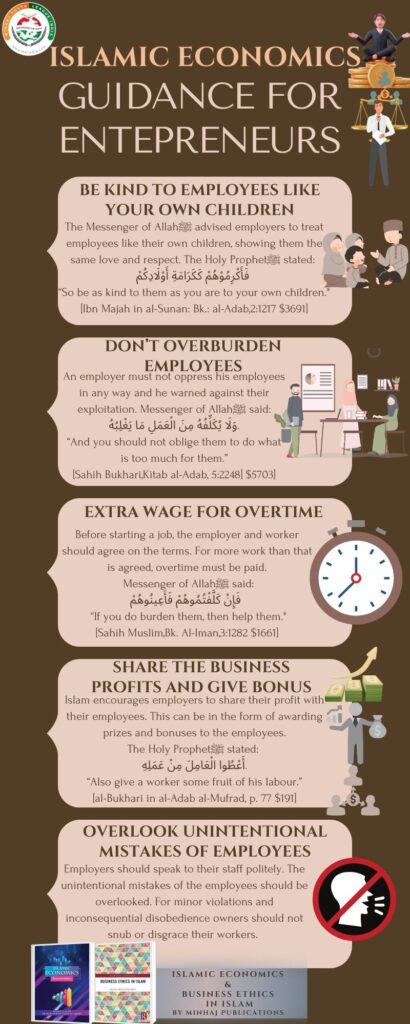The recent unfortunate demise of a 26 year old Ernst & Young employee in Pune has sparked a debate about toxic corporate work culture. In today’s fast-paced and highly competitive work environment, many individuals face the challenges of toxic work culture, which can lead to stress, burnout, and a lack of fulfillment. Issues like unhealthy competition, poor leadership, discrimination, and lack of compassion erode the foundation of a productive workplace. However, Islam offers a holistic approach to addressing these issues by promoting values such as fairness, integrity, teamwork, and compassion. Rooted in teachings from the Qur’an and the Hadith, Islamic principles emphasize the importance of justice, mutual respect, and a balanced work-life dynamic. This article explores how Islamic values can provide solutions to toxic work culture, fostering a healthier, more ethical, and inclusive workplace environment. The Messenger of Allahﷺ gave precise directions to entrepreneurs and employers so that they might deal with employees responsibly in the workplace.
ʙᴇ ᴋɪɴᴅ ᴛᴏ ᴇᴍᴘʟᴏʏᴇᴇs ʟɪᴋᴇ ʏᴏᴜʀ ᴏᴡɴ ᴄʜɪʟᴅʀᴇɴ
The Messenger of Allahﷺ advised employers to treat employees like their own children, showing them the same love and respect. The Holy Prophetﷺ stated:
فَأَكْرِمُوْهُمْ كَكَرَامَةِ أَوْلَادِكُمْ
“So be as kind to them as you are to your own children.” [Ibn Majah in al-Sunan: Bk.: al-Adab,2:1217 $3691]

ᴅᴏɴ’ᴛ ᴏᴠᴇʀʙᴜʀᴅᴇɴ ᴇᴍᴘʟᴏʏᴇᴇs
It is Allah’s practice not to burden any individual beyond their capacity. Correspondingly, Muslims are advised not to burden women, children and the infirm to work more than they can and ideally they should not be required to work. An employer must not oppress his employees in any way and he warned against their exploitation. Messenger of Allahﷺ said:
وَلَا يُكَلِّفُهُ مِنَ الْعَمَلِ مَا يَغْلِبُهُ.
“And you should not oblige them to do what is too much for them.” [Sahih Bukhari,Kitab al-Adab, 5:2248] $5703]
ᴇxᴛʀᴀ ᴡᴀɢᴇ ғᴏʀ ᴏᴠᴇʀᴛɪᴍᴇ
Before starting a job, the employer and worker should agree on the terms. For more work than that is agreed, overtime must be paid. Messenger of Allahﷺ said:
فَإِنْ كَلَّفْتُمُوهُمْ فَأَعِينُوهُمْ
“If you do burden them, then help them.” [Sahih Muslim,Bk. Al-Iman,3:1282 $1661]
sʜᴀʀᴇ ᴛʜᴇ ʙᴜsɪɴᴇss ᴘʀᴏғɪᴛs ᴀɴᴅ ɢɪᴠᴇ ʙᴏɴᴜs
Islam encourages employers to share their profit with their employees. This can be in the form of awarding prizes and bonuses to the employees. The Holy Prophetﷺ stated:
أَعْطُوا الْعَامِلَ مِنْ عَمَلِهِ.
“Also give a worker some fruit of his labour.” [al-Bukhari in al-Adab al-Mufrad, p. 77 $191]
ᴏᴠᴇʀʟᴏᴏᴋ ᴜɴɪɴᴛᴇɴᴛɪᴏɴᴀʟ ᴍɪsᴛᴀᴋᴇs ᴏғ ᴇᴍᴘʟᴏʏᴇᴇs
Employers should speak to their staff politely. The unintentional mistakes of the employees should be overlooked. For minor violations and inconsequential disobedience owners should not snub or disgrace their workers. Rather they should practice Islamic ideals of forgiveness and tolerance. The following tradition instructs employers to reflect the spirit of generosity upon their employees:
عَنْ عَبْدِ اللَّهِ بْنِ عُمَرَ يَقُولُ : جَاءَ رَجُلٌ إِلَى النَّبِيِّ ﷺ فَقَالَ : يَا رَسُوْلَ اللَّهِ، كَمْ أَعْفُو عَنِ الْخَادِمِ؟ فَصَمَتَ رَسُوْلُ اللَّهِ ، ثُمَّ قَالَ: يَا رَسُوْلَ اللهِ، كَمْ أَعْفُو عَنِ الْخَادِمِ؟ فَقَالَ: كُلَّ يَوْمٍ سَبْعِينَ مَرَّةً.
According to ‘Abd Allah b. Umar (RA): “A man came to the Prophetﷺ and submitted, ‘ O Messenger of Allah! How often should I pardon the servant?’
He kept silent. The man again asked, ‘ O Messenger of Allah! How often should I pardon the servant?’
So the Messenger of Allahﷺ said, ‘Seventy times each day.” [Sunan Abu Dawud Bk.Al-Adab,4:341 $5164]




